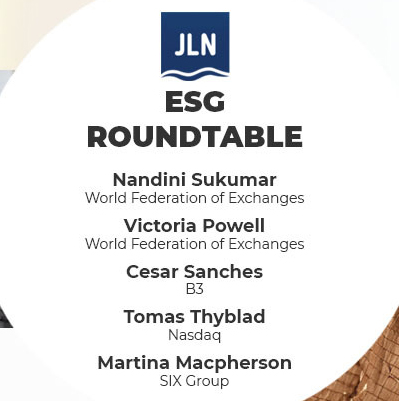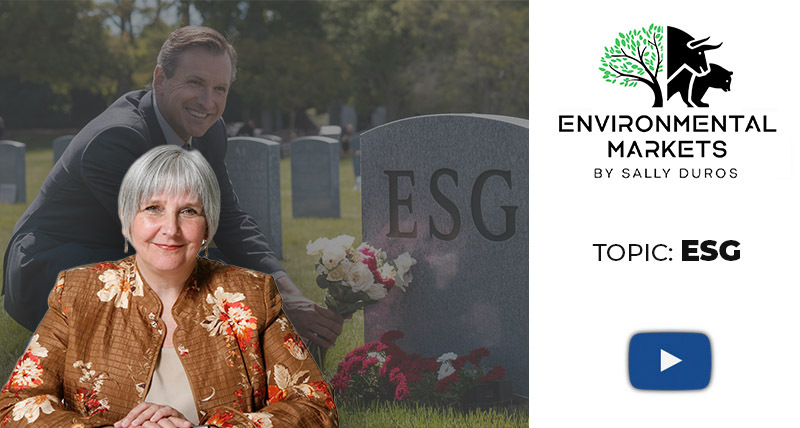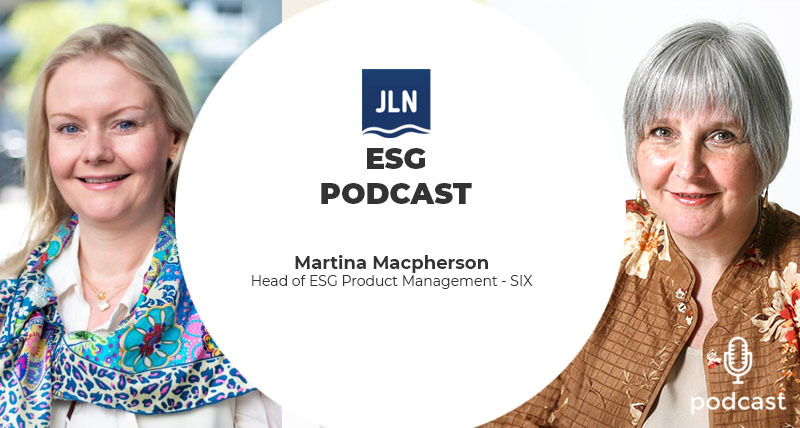Episode Transcript
[00:00:06] Speaker A: Could you tell us about the WFE survey? When did it start? How has it grown? How long have you been doing it?
[00:00:13] Speaker B: It's our 9th annual survey. Yep, you heard that right. It's 9th we've been doing. We started to do this survey all that time ago because exchanges, who have been the pioneers in sustainability and ESG, et cetera, realized that they were doing a lot of things. We wanted to capture the trends. We wanted to map our industry's evolution and progress. And we find ourselves now, nine years later with the survey. And it's fascinating, if you look back from the beginning to the 9th, how things have evolved, though they have evolved essentially in one direction, and that direction is obviously growing engagement with all aspects of sustainability.
[00:01:02] Speaker A: What do you mean by that? What do you mean by all aspects of sustainability?
[00:01:06] Speaker B: The exchanges, the way I think about it and the way as an industry we think about ESG, is that exchanges are the center of the center, right? When I say that, I mean that if you think about financial or capital markets, which know the space that all John Lothian newsletter readers inhabit, if you think about those markets, public markets, as being the center of our economic ecosystem, the exchange sits and the CCP sits right in the center of that. Because as an industry, we have multiple touch points with the ESG conversation. If you're a stock exchange, you obviously engage with the issuer community, right? So you're in the front line of all that interesting work and dialogue and conversation that's happening in the company and the issuer space in your capacity as a listing venue if you're a derivatives exchange. And this year we've had five derivatives exchanges in the survey. So capturing some of the themes. If you're on the derivatives exchange, it's a really exciting time because you're right at the forefront of the conversation around voluntary carbon markets and you are really doing what public derivatives markets do best, which is you are solving problems with product and innovation. So this year, for the first time since the first edition of the survey nine years ago, every single exchange that responded to the questionnaire participated in at least one ESG initiative and engaged in at least one of the WFE sustainability principles. And this is a milestone because that's 100% of survey respondents. And if you look at where we are, the number of ESG initiatives that our members are responding to has grown as well. So it's not just the absolute scale of engagement with ESG that's rising.
There are multiple touch points now more than ever before.
[00:03:20] Speaker A: How many exchanges surveyed this year and how do you determine who to survey or how does that work?
[00:03:27] Speaker B: So the first thing to remember is that WFE represents about 250 to 300 market infrastructures around the world, right? And we do that because many exchange groups own more than one exchange or CCP. So what we do, and the questionnaire and the methodology is every year we sit down in advance of a survey going out with the WFE sustainability working group. And this is an important industry forum, which I think everyone should know about because they do awesome work and they are essentially the professionals, the ESG professionals in the market infrastructure space. So more and more exchanges have chief sustainability officers, and the WFE sustainability working group is where all of them gather. So we bring together the technical experts, people at exchanges who are leading and really leading the work on sustainability every year. So the sustainability working group sits down and thinks about the questionnaire, because we obviously want the questionnaire to evolve with themes and the trends. We want it also to remain consistent, that that's the way we map the trend. So we want the same questions that we had in survey one, but we also want to be cognizant of what new trends and developments we need to be looking out for. So we sit down, we agree.
What is in them? For example, a classic example is we've added gender diversity. Now into the survey.
We're asking specifically about carbon, carbon emissions, carbon markets, et cetera. So that's some of the newer questions and trends that we're mapping. And then we have the very core stuff like, what are people concerned about? How are you engaging with the sustainability principles, the WFE sustainability principles, what is product like, et cetera? So the answer to that, because I know that's always an important question, is green bonds remain the single most popular ESG product.
But, and this is the beginning of an emerging trend, green equity. For the first time this year, we have three exchanges in the survey who have also introduced green equity, and they're relying on either their own standards or those established by national regulators.
[00:05:53] Speaker A: Green equity, how does that work? It sounds ambitious. It sounds good.
[00:05:59] Speaker B: The last 18 months, if you like, it's all been about greenwashing, right? How can we make sure that when any product is labeled green, that it truly is green? So the WFE green equity framework, it's a milestone event because exchanges globally have agreed what constitutes a green equity? And we did it. It was a year long process in the sustainability working group. But basically we came together as an industry. We agreed how we would think about green in the equity context. And now we will go forward and start. We will implement that. Our members are creating products around it. They'll be looking to see how they can classify products as green, et cetera. Why did we do it? Well, apart from the fact that there was greenwashing, and we wanted to support that and offer a clean kite, Mark. We wanted to enable exchanges to promote improved access to capital by issuers whose activities are primarily green. And we also wanted to provide investors with additional information on green activities that would aid their capital allocation decisions. There are two parts to it. So you have the actual principles themselves and the pillars of the principles. There are five pillars of the principles and first of which is revenue or investment. And we say that the percentage of revenues that contribute to the green economy should be based on something public. Right? So you can't just say we're green. You have to actually quantify, you have to have revenue or investment with a number attached to that.
Then we want a taxonomy, because I think we are nothing without a taxonomy. We are nothing without definition. And then we wanted to look at governance issuers will be subject to existing listing requirements implicit in it being publicly listed. Then we'll have an assessment and we'll have disclosure. So those are the five principles through which you approach the green equity guidance or framework. So you have to be able to tick all those five boxes. So revenue taxonomy, governance, assessment and disclosure. And that's the roadmap, if you like. And then we actually look at the criteria for classification and we use those same principles, those overarching pillars that I mentioned.
But for example, we've said for revenues, we've agreed as an industry that listed issuers will need to generate more than 50% of their total annual revenue from activities that contribute to the green economy, et cetera. So every single one of those, we've now assigned a clear KPI to.
[00:09:05] Speaker A: How do your sustainability principles fit into all of this framework?
[00:09:10] Speaker B: So the sustainability principles are really fascinating. So it's an industry led initiative. So we thought a little bit about how we would create a roadmap for exchanges that wanted to foster sustainability within their markets. We have five principles. Again, I feel that there's a theme emerging with these things.
And the five principles are, we looked principle one, which was education. So we've said you have to educate market participants about sustainability issues. Principle two, you have to promote the enhanced availability of ESG information. Principle three, engage stakeholders to advance the agenda and sustainable finance. Principle four, provide markets and products, support the development of sustainable finance. And principle five, obviously embed sustainability into the exchanges governance strategy and organization structure. So kind of how do we live by our own principles? So that was in 2018, and it's been rolled out. And more and more exchanges every year. The industry is making further progress at meeting these five principles. And we've seen adoption and uptick both across every individual principle and also across the suite. So people are now doing, instead of just one, they're doing all five, for example. So that's kind of an internal roadmap, if you like, of the way exchanges think about sustainability for themselves and as organizations.
[00:10:49] Speaker A: I know just in the time that I've been working for. John Lithium News, I have seen a lot of activity increasing on the part of the exchanges in this area.
[00:11:00] Speaker B: One of the things I wonder partly is because exchanges were doing this like 1015 years ago. So we really were the pioneer financial organization in the space.
At least three or four years ago, there were at least 14 exchanges in the survey that were the front line of sustainability, disclosure, et cetera, in their own market. But we have very much welcomed the mainstreaming, as we call it, of sustainability, where people, where the wider ecosystem, every stakeholder is stepping forward to do their part. Five years ago, when we published the survey, there was some media interest. Now there's enormous media interest. People care about the results of the survey. As an industry, we do believe in disclosure. We believe that it's good to tell people what's going on, what you're doing. That's part of transparency, part of accountability. That's part of being ESG. So we are absolutely, as an industry, pressing forward by educating people with what we're doing. About one of the highlights of the survey this year is every year we ask about what's your motivation for sustainability involvement? And the results are really fascinating from year to year. For the last couple of years, we've seen concern about the impact of sustainability as the number one reason, and that really reflects the exchange role, as the listing venue, as the public market with accountability that has investor protection in its dna, et cetera. So we're careful, we're watchful, we're guardians, right? But over the last three, four years, exchanges have increasingly begun to talk about business opportunities. And that's great, because what that means is that our wider stakeholders in the ecosystem are beginning to ask for product. So it isn't just the exchanges anymore, it's everyone else as well. So people are saying, give us green products that we can trade or that we can engage with as part of our own journey in sustainability.
[00:13:14] Speaker A: How much of that information is in.
[00:13:16] Speaker B: Your report to anyone who's interested the reports on our website. It's a great read. Page eleven gives you a really interesting figure. Figure eight. And we say motivations for sustainability involvement, and then we just map them.
And we also give you a comparable for the year ago period. So you can tell whether it's rising or falling. But those top four have been pretty consistent over the last couple of years. And those four are sustainability concerns, expanded business opportunity, a desire to demonstrate leadership, and a desire to improve stakeholder relationships, which is what we were just talking.
[00:13:56] Speaker A: About, sustainability versus ESG. Do you see a difference?
[00:14:02] Speaker B: That's a big question. It is the question. In essence, I think the answer has to be that when we started off, there was an attempt to kind of identify or define or map or put a framework around what people cared about, and that became the ESG label. Right? So I think it'll be really interesting if in five years time we're still talking about ESG or if there's a different term for it, if we're just calling it sustainability, because as we all grow more sophisticated, we're seeing a more nuanced approaches. So, for example, six years ago, people just talked about climate, right? So now people are talking about climate and nature stroke biodiversity. That's just one easy example.
While we were talking about, in the past, people talk about green bonds, now we're talking about gender bonds, we're talking about social bonds. So those categorizations are changing as well. So I think as we as an investing generation and we as an industry and as the stakeholder ecosystem, and that's the buy side, sell side, the ratings agency, everyone in the ecosystem, the index providers, et cetera. As all of us mature in sustainability, we perhaps might begin to see that question addressed more fully. I have no idea if in five years time we'll be calling it ESG or something else.
[00:15:37] Speaker A: For the public, the term sustainability means one thing, and it means something different in your industry, I think.
[00:15:44] Speaker B: I often think that exchanges are the true definition of sustainability. When I think about sustainability, and that's me, Nandini sukuma private individual, I think about things that are beyond ESG, right? Is there accountability? Is there integrity?
Is there kind of good? Are we following the law? Are we keeping the law? We're doing this. So those are all broader than ESG.
[00:16:11] Speaker A: They don't understand how something could be called green. They don't understand how an index fund could have an oil company in there. But honestly, in the capital markets, an oil company is viewed as being sustainable, right? It has good governance, it's going to follow environmental regulations, it's going to pay attention to the people that it hires. So I think that there's some confounding elements.
[00:16:44] Speaker B: I think you put it really well. That I think is also one of the reason people talk and think about transition pathways. Right. Because obviously there's a lot of discussion, especially around sustainable fuel.
And at the same time there's a recognition that we can't just switch off fossil fuel overnight. So for example, let's, if you were to look at the maker of something electric, which currently runs on fuel, and you would say, well, that's in a climate sense that's high rating and it's that company. But then you look at it as an organization as well, and you say, well, they have a diverse board, they have inclusive policies, they have independent directors they follow, they're held out as a role model by regulators, all those things. Then they also tick the g box. And actually g governance is the most mature part of the conversation for exchanges because we've been doing governance for so long. We've been doing governance before it became part of ESG. And that's because of our role as a listings authority venue.
[00:18:00] Speaker A: I think that makes sense. I think I've had several people say to me that the term ESG has become loaded for actually not very good reason, because they say that a good business has to adhere to ESG principles and that in actuality, most good businesses, all good businesses do, and that the real struggle that's going on right now, if there is one, is people in the capital markets and in the business community learning how to articulate their adherence to these principles, to these ESG principles. They're doing it. They just don't know how to talk about it.
[00:18:45] Speaker B: That's a very profound point. I think it's a good point. And I think that as we mature as an investment ecosystem, we will learn to have more language, better language, be more evocative of what we're doing.


